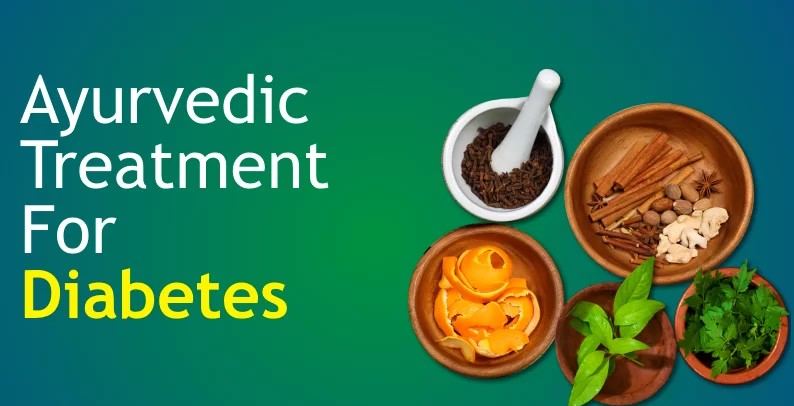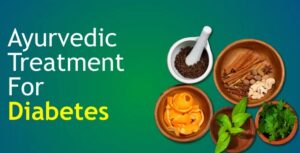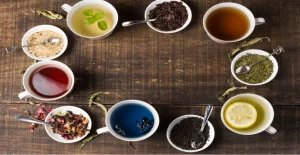Herbal Remedies and Spices That Help Control Blood Sugar

Top Ayurvedic Remedies for Managing Diabetes
Managing blood sugar naturally is possible when herbs and spices are combined with a healthy diet and active lifestyle. Many of these ingredients have been used for centuries in Ayurvedic, Traditional Chinese Medicine, and other traditional practices, and modern studies now support their beneficial effects.
In this article, we explore the most effective herbs and spices for blood sugar control, how they work, and safe ways to incorporate them into your daily routine.
Top Herbs and Spices for Blood Sugar Management
Several herbs and spices have shown significant potential in improving insulin sensitivity, reducing post-meal glucose spikes, and supporting overall metabolic health. These natural ingredients have been used traditionally in Ayurvedic and Traditional Chinese Medicine for centuries and are now supported by modern research. Incorporating them into a balanced diet can complement conventional diabetes management strategies.
1. Cinnamon (Dalchini)
Benefits:
Cinnamon is one of the most widely studied spices for blood sugar control. Its bioactive compounds, such as cinnamaldehyde, help improve insulin sensitivity and slow the digestion of carbohydrates, which prevents sudden spikes in blood glucose. Research indicates that cinnamon can lower fasting blood sugar by 10–29% in people with prediabetes or Type 2 diabetes. It may also reduce HbA1c, a long-term marker of glucose control.
Usage Tips:
- Add ½ to 1 teaspoon of Ceylon cinnamon to your daily diet.
- Mix it into oatmeal, smoothies, or herbal teas.
- Prefer Ceylon cinnamon over cassia cinnamon to avoid high coumarin intake, which can stress the liver if consumed in excess.
2. Fenugreek (Methi Seeds)
Benefits:
Fenugreek seeds are rich in soluble fiber called galactomannan, which slows glucose absorption in the intestines and supports insulin function. Clinical studies show that fenugreek can reduce post-meal glucose spikes and improve fasting blood sugar levels. It may also help lower cholesterol, making it beneficial for metabolic health.
Usage Tips:
- Soak 1–2 teaspoons of fenugreek seeds overnight and drink the water on an empty stomach.
- You can grind soaked seeds into a paste and add to soups, curries, or smoothies.
- Gradually introduce fenugreek to avoid gastrointestinal discomfort.
3. Turmeric (Haldi)
Benefits:
Turmeric contains curcumin, a powerful anti-inflammatory compound that improves insulin signaling and enhances glucose uptake by cells. Curcumin also protects against diabetic complications, such as neuropathy, kidney damage, and cardiovascular issues, by reducing oxidative stress and inflammation.
Usage Tips:
- Include ½ teaspoon of turmeric in daily meals.
- Prepare golden milk with turmeric, black pepper, and milk (dairy or plant-based) to enhance curcumin absorption.
- Turmeric supplements are available, but always consult a doctor for dosage guidance.
4. Ginger
Benefits:
Ginger contains gingerol and other bioactive compounds that improve insulin sensitivity and help regulate fasting blood glucose. Studies indicate that ginger can lower HbA1c and improve overall metabolic control in diabetic patients. Additionally, it has anti-inflammatory properties that benefit cardiovascular health.
Usage Tips:
- Use 1–2 grams of fresh ginger daily.
- Add fresh ginger to teas, soups, or stir-fried dishes.
- Ginger supplements are also available, but dosage should be monitored if on blood-thinning medication.
5. Bitter Melon (Karela)
Benefits:
Bitter melon contains charantin and polypeptide-p, which mimic insulin activity and improve glucose uptake by cells. It is particularly effective in reducing fasting and post-meal blood sugar levels and has been shown in studies to improve glucose metabolism in Type 2 diabetes.
Usage Tips:
- Drink 50–100 ml of bitter melon juice 2–3 times a week on an empty stomach.
- Add chopped bitter melon to stir-fries or curries.
- Start with small amounts to minimize digestive discomfort.
6. Amla (Indian Gooseberry)
Benefits:
Amla is rich in vitamin C and antioxidants, which protect pancreatic beta cells and improve insulin secretion. Regular consumption supports blood sugar control, reduces oxidative stress, and may improve lipid profiles in diabetic individuals.
Usage Tips:
- Take 1 teaspoon of fresh juice or powder in water every morning.
- Include amla in smoothies, chutneys, or herbal teas.
- Can be consumed fresh or as dried amla powder for convenience.
7. Berberine
Benefits:
Berberine, found in Indian barberry (Daruharidra), is a natural compound shown to lower blood sugar and improve insulin sensitivity. Research shows that berberine can rival metformin in effectiveness. It also supports gut health and helps regulate lipid metabolism.
Usage Tips:
- Available as a supplement, typically in capsules.
- Start with a low dose and gradually increase under a doctor’s supervision.
- Important: Avoid combining with other diabetes medications without professional guidance.
8. Holy Basil (Tulsi)
Benefits:
Holy basil acts as an adaptogen, reducing stress-induced glucose spikes and supporting overall metabolic balance. It has anti-inflammatory properties and can improve insulin action in the body.
Usage Tips:
- Drink tulsi tea daily.
- Chew 2–3 fresh leaves in the morning on an empty stomach.
- Tulsi can also be incorporated into soups or herbal concoctions.
9. Neem
Benefits:
Neem contains bitter compounds that improve glucose uptake by cells and reduce absorption in the intestines. It also has antioxidant and anti-inflammatory effects that help protect against diabetic complications.
Usage Tips:
- Use neem capsules or juice in small doses under professional guidance.
- Avoid high doses to prevent digestive or liver stress.
- Can be combined with other blood sugar-friendly herbs for synergy.
10. Clove, Curry Leaves, Garlic, and Black Cumin (Kalonji)
Benefits:
These spices have bioactive compounds that support insulin function, reduce oxidative stress, and may moderately lower blood sugar over time. While their effect is mild individually, consistent use in cooking provides cumulative benefits.
Usage Tips:
- Incorporate into daily meals: add cloves to rice dishes, curry leaves in stir-fries, garlic in sauces, and kalonji to bread or curries.
- Can be used in combination for better metabolic support.
Important Notes on Using Herbal Remedies
- Not a replacement for medication: These herbs enhance blood sugar control but should not replace prescribed drugs.
- Monitor blood sugar: If you are on medication, check glucose regularly to avoid hypoglycemia.
- Consult your doctor: Especially if combining herbs with diabetes medications.
How to Incorporate These Herbs Safely
Using herbs and spices to help manage blood sugar can be highly effective, but it’s important to do so carefully and thoughtfully. Here’s how to maximize benefits while minimizing risks:
Introduce One Herb at a Time
Start with one herb or spice before adding others. This helps you observe its effects on your blood sugar and identify any allergic reactions or digestive issues. For example, try cinnamon for a week, monitor your blood glucose, and then add fenugreek or turmeric gradually.
Consistency is Key
Small, daily doses are generally more effective than taking a large amount sporadically. Regular use ensures your body gradually adapts and maintains steady glucose control. Avoid sudden spikes in dosage, as this can cause digestive upset or unintended blood sugar fluctuations.
Pair with Healthy Lifestyle Habits
Herbs work best when combined with a balanced diet, regular physical activity, and stress management. Eating nutrient-dense foods, staying active, and practicing relaxation techniques like yoga or meditation can enhance the effects of these natural remedies on blood sugar control.
Track Your Progress
Maintain a blood sugar log to measure the impact of each herb or spice. Record your fasting, post-meal, and bedtime glucose readings along with notes about what herbs you consumed and when. Tracking trends over time will help you and your healthcare provider adjust dosages safely and optimize your blood sugar management plan.
Seek Professional Guidance
Always consult your doctor or dietitian before combining herbal remedies with prescribed diabetes medications. Some herbs can interact with insulin or oral medications, increasing the risk of hypoglycemia (low blood sugar). Professional guidance ensures safety and effective results.
Additional Lifestyle Tips for Blood Sugar Control
Managing blood sugar effectively is not just about herbs and supplements; a healthy lifestyle plays a crucial role. Incorporating balanced habits into daily life can significantly improve insulin sensitivity, prevent spikes in glucose, and support long-term metabolic health. Here’s how to do it:
1. Maintain a Balanced Diet
Eating a nutrient-rich diet helps regulate blood sugar and supports overall health. Focus on:
- Vegetables: Include a variety of colors to provide vitamins, minerals, and fiber. Examples: spinach, broccoli, bell peppers.
- Whole grains: Opt for oats, brown rice, quinoa, and barley instead of refined grains. They release glucose slowly, preventing spikes.
- Lean proteins: Fish, chicken, beans, lentils, and tofu help maintain muscle mass and stabilize blood sugar.
- Healthy fats: Sources like avocados, nuts, seeds, and olive oil improve insulin sensitivity and reduce inflammation.
Tip: Plan meals with a balance of carbohydrates, protein, and healthy fats to maintain steady energy levels throughout the day.
2. Stay Physically Active
Regular physical activity is one of the most effective ways to improve insulin sensitivity and lower blood sugar.
- Aerobic exercises: Walking, jogging, swimming, or cycling for at least 30 minutes most days of the week.
- Strength training: Bodyweight exercises, resistance bands, or light weights 2–3 times per week to build muscle, which helps glucose uptake.
- Fun activities: Dancing, sports, or family outings make exercise enjoyable and sustainable.
Tip: Pair exercise with blood sugar monitoring to understand how activity affects glucose levels and adjust meals or medication accordingly.
3. Avoid Processed Sugars and Refined Carbs
High-sugar and refined foods can lead to rapid spikes in blood glucose, increasing insulin demand and the risk of long-term complications.
- Minimize sugary drinks, sweets, pastries, white bread, and packaged snacks.
- Replace them with natural, fiber-rich alternatives like fruits, whole-grain snacks, or homemade meals.
Tip: Read nutrition labels carefully and aim for foods with a low glycemic index to maintain steady blood sugar.
4. Prioritize Sleep and Stress Management
Poor sleep and chronic stress can negatively impact insulin sensitivity and glucose metabolism.
- Sleep: Aim for 7–9 hours of quality sleep per night. Sleep deprivation increases cortisol, a stress hormone that raises blood sugar.
- Stress reduction: Practice mindfulness, meditation, yoga, or deep breathing exercises. Even short daily breaks can improve stress resilience and support blood sugar control.
Written by:
Michael Tan, RD, Registered Dietitian
Michael Tan is a registered dietitian specializing in nutrition for diabetes management and metabolic health. With over 10 years of experience, he helps individuals incorporate evidence-based dietary strategies, herbal remedies, and lifestyle changes to support healthy blood sugar control. Michael is passionate about making nutrition practical, sustainable, and enjoyable for all ages.
Reviewed by:
Dr. Laura Chen, MD, Endocrinologist
Dr. Laura Chen is a board-certified endocrinologist with more than 12 years of experience in managing diabetes and metabolic disorders. She focuses on combining conventional medical care with lifestyle and nutritional interventions to optimize blood sugar control.
References
- Wang H. Metformin and berberine, two versatile drugs in the treatment of type 2 diabetes mellitus. Pharmacological Research. https://pubmed.ncbi.nlm.nih.gov/16322803/
- Wang H. Metformin and berberine, two versatile drugs in the treatment of type 2 diabetes mellitus. PubMed Central (PMC). https://pmc.ncbi.nlm.nih.gov/articles/PMC5839379/
- American Diabetes Association. Hypoglycemia (Low Blood Glucose). American Diabetes Association. https://diabetes.org/living-with-diabetes/hypoglycemia-low-blood-glucose
- Diabetes Daily Tips. Low Glycemic Index (GI) Foods for Better Blood Sugar Control. Diabetes Daily Tips. https://diabetesdailytips.com/low-glycemic-index-gi-foods-for-better-blood-sugar-control/






